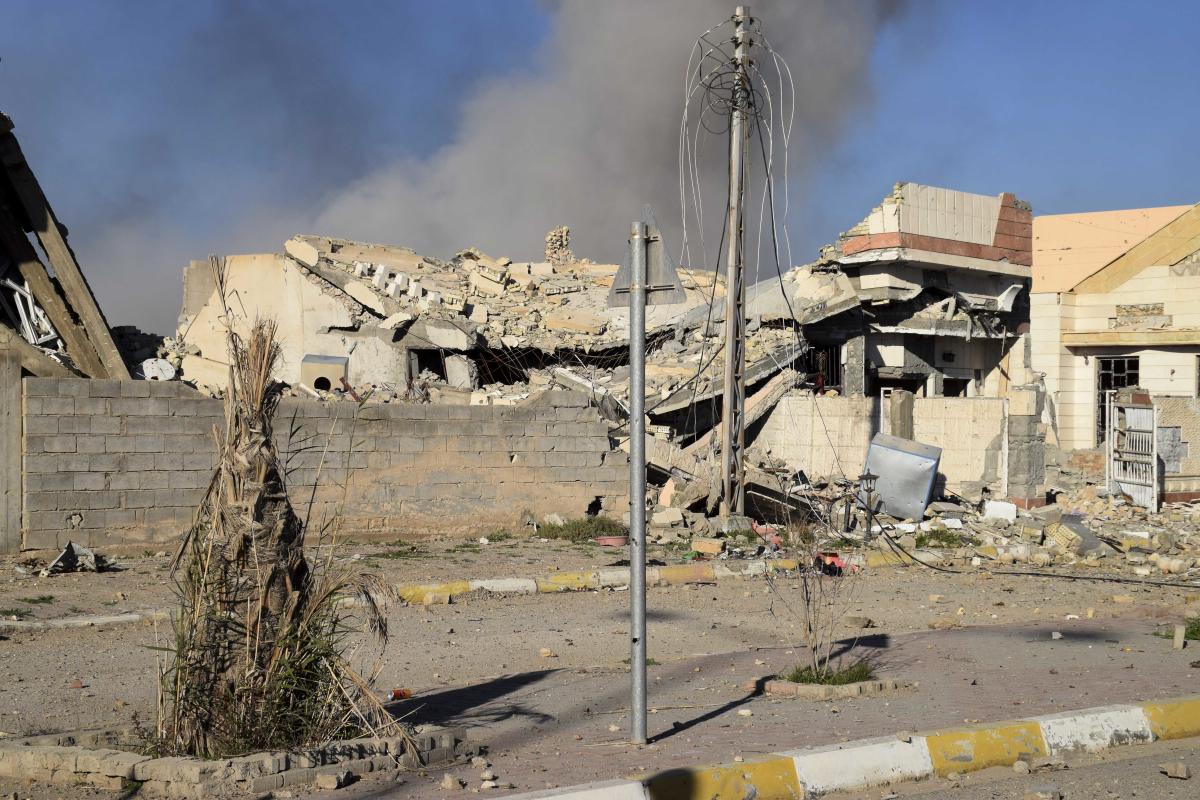The Scars of War
"One hundred percent of this is on ISIL [Islamic State of Iraq and the Levant], because no one would be dropping any bombs if ISIL hadn't gone in there."
Col. Steven H. Warren, Pentagon spokesman in Iraq
"A few hundred jihadis were killed, mostly in airstrikes. [Very few had been taken prisoner."
"They don't surrender. They blow themselves up."
Lt.Gen. Abdul-Ghani al-Asadi, Afghan force commander
"Ramadi is a city of ghosts."
"If there are not serious international efforts, it will not be rebuilt."
Sabah Karhout, head, Anbar provincial council
 |
| Members of Iraq's elite counter-terrorism service ride their military vehicles amidst destroyed buildings in Ramadi on December 29, 2015 (AFP Photo/Ahmad Al-Rubaye) |
From a population of approximately 400,000 there are scant few civilians left in the city of Ramadi. There is nothing for them there; no electricity, nor running water. All supplies must be brought in by truck. Water and fuel tankers vie for space on the roads with armoured vehicles, in a city destroyed, its civil infrastructure in ruins. Everything reduced to rubble wherever one looks in one neighbourhood after another; just one vast arras of wreckage.
This is war. This is the kind of war where foreign liberators help the national military retake towns and villages and cities occupied by opponents of the national regime through aerial bombing to 'soften' resistance before the military will venture beyond the outskirts of the cities' outlying areas, themselves devastated by improvised explosive devices meant to keep the military on its toes and out of the central core areas.
When Islamic State fighters enter a community they seize those homes that appeal most strongly to their sense of entitlement while digging tunnels and laying an extensive network of explosives. Should their presence in the city be challenged, they exercise a scorched-earth policy of leaving nothing for the former residents to return to, and a hollow victory for the military battalions that have managed to dislodge the presence of the ISIL fighters.
 |
| Iraqi security forces and allied Sunni tribal fighters help trapped civilians to to cross from neighborhoods under control of the Islamic State group to neighborhoods under control of Iraqi security forces in Ramadi, 70 miles (115 kilometers) west of Baghdad, Iraq, Monday, Jan. 4, 2016. The Islamic State group had captured Ramadi in May, in one of its biggest advances since the U.S.-led coalition began striking the group in 2014. Recapturing the city, which is the provincial capital of Anbar, provided a major morale boost for Iraqi forces. (AP Photo) |
As far as the United States and its allies are concerned their bombing of ISIL strongholds and the towns, villages and cities they've taken from the government in Baghdad, everything is justified; the fault of destruction is not theirs, but is to be laid at the feet of the jihadis who pride themselves on establishing a caliphate and outrunning the western dogs of imperialism.
But it is a resounding victory for the U.S.-led coalition that an estimated 30 percent of the territory once controlled by ISIL in Iraq and Syria is now returned to the Iraqi and Syrian regimes.
Not worth the bother to ruminate on the incontrovertible fact that the conflict would not have degenerated to this point had those regimes not indulged in their ages-old sectarian hatreds, each viewing the other sect as betrayers of Islam. The Sunnis regarding the Shiites as apostates and the Shiites challenging the Sunnis as unspeakable heretics, each considering the other to be fodder for martyrdom actions.
There is funding for destruction, for challenging the enemy, for meeting in combat. Funding, however, is scarce leaving few resources to rebuild communities in ruin, like Kobani in Syria and Sinjar in Iraq. Of course the allied forces have yet to remove ISIL from Raqqa, their capital in Syria, and from Mosul in Iraq, along with the many other towns and villages where they have established their rule.
But a demoralized regime seeks to congratulate itself and its military whenever it can.
The collapsed homes, the shrapnel-bitten shop fronts and craters left by airstrikes are unfortunate needless to say, but a reality of war. There are no-go zones where booby traps await disarming before people can be allowed to enter and regard with fulsome dismay what precisely it is they have been permitted to return to.
Those tunnels that passed under streets and pathways between houses were hidden by tarps or slats of wood so ISIL fighters' movements could be hidden from surveillance drones. Fighters after all would not last very long to give battle to their opponents if they did not take the most elementary of all rudimentary military actions to protect themselves from instant obliteration.
The Ramadi General Hospital, the largest such institution in the province sustained heavy damage as the departing ISIL fighters detonated explosives while security forces approached nearer the premises. The U.S.-led coalition launched over 630 airstrikes in the area in the past six months. The Iraqi counterterrorism forces advanced once the coalition had kindly cleared their way for them.
As for the local officials, they are concerned over where the money needed to rebuild the city will miraculously materialize from. They consider the magnitude of the destruction beyond their wildest nightmares, and lament reality.
 |
| Smoke rises over destroyed Islamic State positions following a U.S.-led coalition airstrike, as Iraqi Security forces enter the heavy damaged downtown Ramadi, 70 miles (115 kilometers) west of Baghdad, Iraq, Sunday, Dec. 27, 2015. Islamic State fighters are putting up a tough fight in the militant-held city of Ramadi, slowing down the advance of Iraqi forces, Gen. Ismail al-Mahlawi, head of the Anbar military operations, said Sunday. (AP Photo) |
Labels: Conflict, Iraq, Islamic State, Syria, United States

<< Home